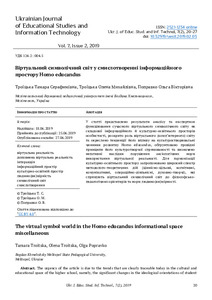Будь ласка, використовуйте цей ідентифікатор, щоб цитувати або посилатися на цей матеріал:
http://elar.tsatu.edu.ua/handle/123456789/11895| Назва: | Віртуальний символічний світ у смислотворенні інформаційного простору Homo educandus |
| Інші назви: | The virtual symbol world in the Homo educandus informational space miscellaneous |
| Автори: | Троїцька, Т. С. Троїцька, О. М. Поправко, Ольга Вікторівна Поправко, Ольга Викторовна |
| Ключові слова: | віртуальна реальність;доповнена віртуальна реальність;інтеракція;інформаційний простір;культурно-освітній простір;людино(ви)мірність;символічний світ;смислотворення;virtual reality;complementary virtual reality;interactivity;information space;cultural and educational space;human dimension;symbolic world;creation of meaning |
| Дата публікації: | 2018 |
| Серія/номер: | Ukrainian Journal of Educational Studies and Information Technology;Т. 7, Вип. 2 (С. 20–27) |
| Короткий огляд (реферат): | UK: У статті представлено результати аналізу та експертизи функціювання сучасного віртуального символічного світу як складової інформаційного й культурно-освітнього просторів особистості, розкрито роль віртуального (комп’ютерного) світу та окреслено тенденції його впливу на культуростворювальні чинники розвитку Homo educandus, обґрунтовано провідні принципи його культуротворчої спрямованості та визначено негативні наслідки порушення аксіологічних норм використання віртуальної реальності. Для гармонізації культурно-освітнього простору запропоновано широкий спектр методолого-теоретичних дій (ціннісно-цільові, когнітивні, комунікативні, операційно-діяльнісні, духовно-творчі), які спрямують віртуальний символічний світ до філософсько-педагогічних орієнтирів та норм людино(ви)мірності. EN: The urgency of the article is due to the trends that are clearly traceable today in the cultural and educational space of the higher school, namely, the significant changes in the ideological orientations of student youth that are associated with the emergence of "postmodern" consciousness. This situation is connected with the formation of the information society. The formation of the personality, its motives, values, behavioral skills occurs in the convergent space of the collision of the virtual and real world. The article presents the results of the analysis and examination of the functioning of the modern virtual symbolic world as a component of the informational and cultural-educational spaces of the individuals. The role of the virtual (computer) world and the tendencies of its influence on the cultural developmental factors of the development of Homo educancy are outlined. It was discovered that virtual (computer) reality as a component of the symbolic world offers a person wide opportunities for information exchange and communication in the "space of freedom", but at the same time there are traces when it is transformed on its simulacrum from the symbolic space that exists in real space and time. The simulacrum is deprived of value and sacred meanings, creating separate elements of perception and understanding of information. The authors substantiate the leading principles of the cultural orientation of the virtual world and identified the negative consequences of violating the axiological norms of the use of virtual reality. As a conclusion, a wide range of opportunities offered by the virtual symbolic world is proposed, accompanied by philosophical and pedagogical guidelines and norms based on human dimension. This will be facilitated by the search for approaches, principles, methods, techniques and means of strengthening the symbolic cultural potential of the virtual world that fills the modern information space of Homo educandus in order to maximally bring it closer to the cultural and educational space. |
| URI (Уніфікований ідентифікатор ресурсу): | http://elar.tsatu.edu.ua/handle/123456789/11895 |
| Розташовується у зібраннях: | кафедра Суспільно-гуманітарні науки |
Файли цього матеріалу:
| Файл | Опис | Розмір | Формат | |
|---|---|---|---|---|
| 20.pdf | 254.96 kB | Adobe PDF |  Переглянути/Відкрити |
Показати повний опис матеріалу
CORE Recommender
Перевірити
Усі матеріали в архіві електронних ресурсів захищені авторським правом, всі права збережені.
